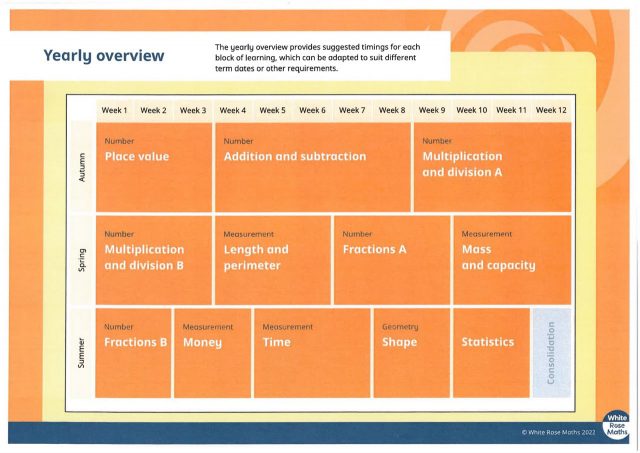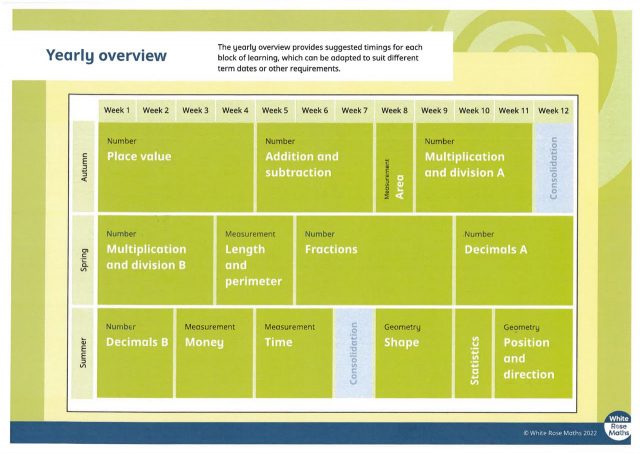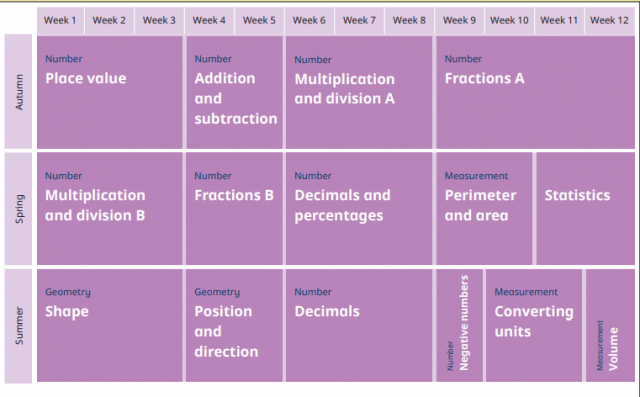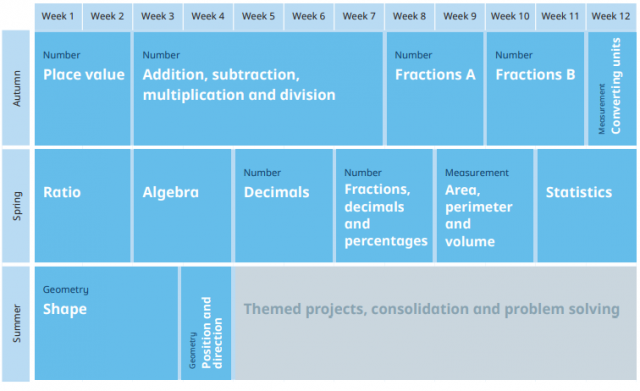Mathematics from the Ancient Greek máthēma means ‘knowledge, study, learning’. It is an area of knowledge which includes the study of arithmetic and number theory.
Our vision
Wensum understands the role in which high quality teaching of Mathematics plays in a child’s education and how it will set them up to be a Mathematician for life. Wensum’s aim is for pupils to leave schooling with confident strategies for calculation and arithmetic, the ability to explain their reasoning and problem solve and a passion for Mathematics.
The Maths curriculum that is taught is centred around the White Rose Hub Mathematics scheme, and supplemented with high quality resources, such as Nrich and Deepening Understanding, to ensure we provide pupils with deeper knowledge and understanding of mathematical procedures and related concepts.
Yearly Overviews
Year 3

Year 4

Year 5

Year 6

How is maths taught at Wensum?
In KS2 a Maths lesson is taught every day. In all year groups pupils have five minutes of daily arithmetic at the start of Maths lessons giving them opportunities to practice their fluency and confidence with the main four operations. Pupils also have a daily ‘Maths Meeting’ session where they have opportunities to revisit and retrieve prior learning and embed mathematical concepts.
CPA Approach (Concrete, Pictorial, Abstract)
The ‘CPA’ approach is a key element of how Maths is taught at Wensum, and it is integral how children develop mastery of concepts in Mathematics. Throughout our day to day lives Maths is represented by objects, pictures, words, numbers, symbols and the ‘CPA’ approach provides pupils with opportunities to explore new learning, deepen understanding and cement concepts to provide ‘mastery’. This is used in all year groups throughout the school.
With the ‘CPA’ approach pupils physically represent mathematically concepts first. They then use pictures to demonstrate and visualise abstract ideas before finally using numbers and symbols to explain these concepts. By moving through the stages of ‘CPA’ pupils will have gained an understanding of how the abstract concepts ‘look’ and what they represent, meaning they can then apply this knowledge with confidence across a range of different Mathematical problems.
Concrete – Pupils have the opportunity to use concrete objects and manipulatives to help them understand and explain what they are doing.
Pictorial – Pupils build on this concrete approach by using pictorial representations. These representations can then be used to reason and problem solve.
Abstract – With the foundations firmly laid, pupils are be able to move to an abstract approach using numbers and key concepts with confidence.
Fluency, Reasoning and Problem Solving
Fluency, reasoning and problem solving are key elements found in every Maths lesson. The teaching of these supports and challenges pupils in their mastering of concepts and becoming efficient Mathematicians.
Fluency – Pupils should be able to recall and apply mathematical knowledge rapidly and accurately. Pupils should be able to move confidently between contexts and representations, recognise relationships and make connections in mathematics. This will help pupils develop a deep conceptual understanding.
Reasoning – Reasoning is pupils being able to explain their Mathematical learning, how they calculated an answer and how they know it is right. The teaching, understanding and reinforcement of key Mathematical vocabulary is necessary for this.
Problem Solving – Problem solving is when pupils identify, understand and apply relevant mathematical principles and make connections between different ideas. Pupils require opportunities to demonstrate their understanding of concepts through different contexts to provide them with a richer and deeper learning experience. Pupils will combine different concepts to solve more complex problems and apply knowledge to real life situations.
Key Representations
The teaching of Maths at Wensum is centred around key representations you will see in Maths lessons across the school.
Part Whole Model
Ten Frame
Base Ten
Place Value Counters
Arrays
Bar Model
Number Line
Number Formation
Neat, presentable and accurate number formation is important at Wensum.
This image outlines how pupils are taught to form the digits 0-9:

WhiteRose
At Wensum we use the White Rose Maths scheme to support our planning and teaching of Maths throughout school. White Rose Maths is a scheme that has been developed by a team of passionate maths teaching experts who are influenced, inspired and informed by the work of leading maths researchers and practitioners across the world. The scheme’s fundamental belief is that ‘everyone can do Maths’, and it is designed to teach to the ‘mastery’ of concepts so pupils become confident and resilient mathematicians.
While the White Rose is the ‘spine’ of the Wensum Maths curriculum teachers enrich the content with resources from other high quality Maths websites, such as Deepening Understanding and NRICH, to provide pupils with enriched, well rounded and high quality Maths lessons.
Useful websites
https://www.sumdog.com/user/sign_in
https://sso.prodigygame.com/login?rid=c0c34131-3996-4942-9dd9-b35b902e1535
